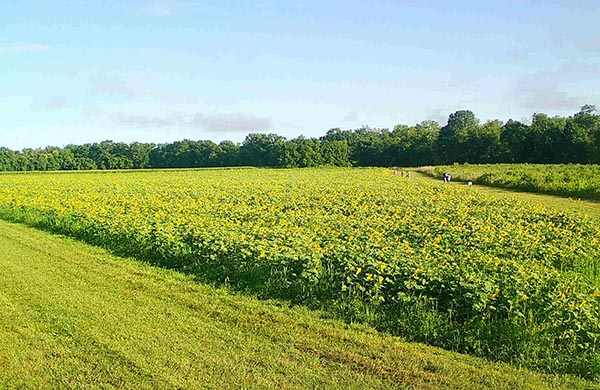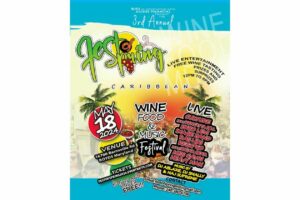The Maryland Department of Natural Resources – Wildlife and Heritage Service plants sunflowers each spring on the McKee-Beshers Wildlife Management Area (WMA). The primary purpose for planting sunflowers on wildlife management areas is to provide a food source for mourning doves, as well as other wildlife species, after the plants mature and dry. Mourning doves are hunted at these fields during hunting seasons that traditionally begin on September 1 and continue through early January.
A number of fields are planted each year, although two fields are designated as Dove Management Fields. The Dove Management Area fields have restricted times and days when hunting can occur during the month of September. In addition to mourning doves, sunflowers and sunflower seeds are a favorite food source for a host of other songbirds, mammals and pollinators. Sunflowers require pollination by insects, usually bees, to produce a seed crop. In turn, honey bees and many species of native bees, benefit from the abundant nectar and pollen that sunflowers produce.
The many benefits of sunflowers are lost when they are cut or trampled by people. These sunflowers are planted for the benefit of wildlife and regulations prohibit the cutting, destruction or removal of any plants from these areas. The public is welcome to visit, admire and photograph the sunflowers in bloom. However, visitors must be responsible and ensure that their actions don’t have negative consequences.
Wildlife Management Area Access:
McKee-Beshers WMA may be accessed any time of day with no overnight camping allowed. There is no fee or permit required to access the property. Wildlife species, after the plants mature and dry. Mourning doves are hunted at these fields during hunting seasons that traditionally begin on September 1 and continue through early January.
A number of fields are planted each year, although two fields are designated as Dove Management Fields. The Dove Management Area fields have restricted times and days when hunting can occur during the month of September. In addition to mourning doves, sunflowers and sunflower seeds are a favorite food source for a host of other songbirds, mammals and pollinators. Sunflowers require pollination by insects, usually bees, to produce a seed crop. In turn, honey bees and many species of native bees, benefit from the abundant nectar and pollen that sunflowers produce.
The many benefits of sunflowers are lost when they are cut or trampled by people. These sunflowers are planted for the benefit of wildlife and regulations prohibit the cutting, destruction or removal of any plants from these areas. The public is welcome to visit, admire and photograph the sunflowers in bloom. However, visitors must be responsible and ensure that their actions don’t have negative consequences.
How and when they are planted:
The techniques used to plant the sunflowers, and the sunflower variety planted, may change from year to year, as well as the number of acres planted and their locations. Sunflowers are planted in late April or early May. Weather, seed variety, weed competition, soil condition and herbivore damage will all impact the time that it takes for the plants to bloom. With favorable conditions, the sunflowers will bloom in mid-July.
After the sunflowers are done blooming and seeds are mature, in early to mid-August, strips are mowed through the sunflowers to scatter the seeds on the ground where they are more accessible to mourning doves and other wildlife.
Area Regulations:
- Destruction or removal of any plants (including sunflowers) is strictly prohibited.
- Parking is only allowed in designated parking areas.
- Do not block gates. Violators may be towed and ticketed.
- Driving is only allowed on main roads (River Road, Hunting Quarter Road, and Sycamore Landing Road). Only authorized or emergency vehicles allowed behind gates.
- Dogs are allowed, but must be leashed.
- Wildlife Management Areas are trash-free. No trash cans are provided. Please take all trash with you.
- Commercial activities are prohibited.
Directions: From the Capital Beltway, take Exit 39 (River Road) west toward Potomac. Proceed for approximately 11 miles to the intersection of River Road and MD 112, Seneca Road. Turn left and continue on River Road for about 2 1/2 miles. McKee-Beshers will be on your left as you head west on River Road.
Tips for a successful visit:
- McKee-Beshers WMA has no bathroom facilities, no benches and no picnic tables. Please plan accordingly.
- McKee-Beshers WMA is home to ticks, mosquitoes and poison ivy. Long pants, bug spray and close-toed shoes are recommended.
- Please note that trails are unmanicured dirt or gravel that can be rough or muddy and may be unsuitable for strollers.
Current sunflower conditions: Sunflower status on July 21, 2023
Recent Stories
FEST OF SPRING Caribbean Wine Food & Music Festival
Get ready to experience the vibrant colors, tantalizing flavors, and infectious rhythms of the Caribbean at the FEST OF SPRING Caribbean Wine Food & Music Festival! Hosted by RHU LLC, this exciting festival is set to take place on May 18, 2024, at the picturesque 16700 Barnesville Rd in Boyds, MD.
Step into a world where the Caribbean spirit comes alive! From 12:00 PM onwards, immerse yourself in a sensory journey that celebrates the unique culture, cuisine, and music of the Caribbean. Whether you’re an African American, a Reggae or Soca music enthusiast, a wine lover, or part of the vibrant Caribbean diaspora, this festival promises to delight and captivate you in every way.







